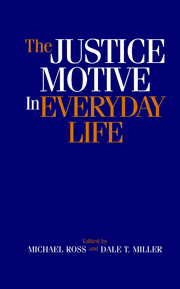Book contents
- Frontmatter
- Contents
- List of Contributors
- Introduction
- Theoretical Perspectives on the Justice Motive
- Victim Derogation and the Belief in a Just World
- The Justice Motive and Prosocial Behavior
- Justice-Based Reactions to Transgressors
- 16 Retributive Justive: Its Socical Context
- 17 Just Punishments: Research on Retributional Justice
- 18 Deservingness, Entitlement, and Reactions to Outcomes
- 19 Just World Processes in Demonizing
- Justice and Reaction to One's Own Fate
- Name Index
- Subject Index
18 - Deservingness, Entitlement, and Reactions to Outcomes
Published online by Cambridge University Press: 08 September 2009
- Frontmatter
- Contents
- List of Contributors
- Introduction
- Theoretical Perspectives on the Justice Motive
- Victim Derogation and the Belief in a Just World
- The Justice Motive and Prosocial Behavior
- Justice-Based Reactions to Transgressors
- 16 Retributive Justive: Its Socical Context
- 17 Just Punishments: Research on Retributional Justice
- 18 Deservingness, Entitlement, and Reactions to Outcomes
- 19 Just World Processes in Demonizing
- Justice and Reaction to One's Own Fate
- Name Index
- Subject Index
Summary
When we say that a person is entitled to some outcome, do we also mean that the person deserves that outcome? Can deservingness (or desert and deservedness – to use equivalent terms) be distinguished from entitlement? Or do both terms carry the same meaning? My aim in this chapter is to consider these questions and to describe a study whose results imply that it is important to distinguish between deservingness and entitlement. I will argue that judgments of deservingness involve reference to a person's actions and that they usually relate to positive or negative outcomes that are contingent on a person's positively or negatively valued behavior. Judgments of entitlement are more externally based, and they depend upon a formal or informal set of rules, laws, principles, expectations, or social norms that refer to or imply a person's rights. First, however, it is necessary to clear some semantic and conceptual ground.
Some Background Literature
I have provided examples from social psychology and legal theory of the ways in which entitlement and deservingness have been used in the literature on social justice in my recent book, Values, Achievement, and Justice: Studies in the Psychology of Deservingness (Feather, 1999b), as well as a conceptual analysis of the two concepts. I present here a summary of some of the main contributions, focusing on how the concepts of entitlement and deservingness have been discussed and incorporated into theory and research about social justice issues.
- Type
- Chapter
- Information
- The Justice Motive in Everyday Life , pp. 334 - 349Publisher: Cambridge University PressPrint publication year: 2002
- 14
- Cited by

